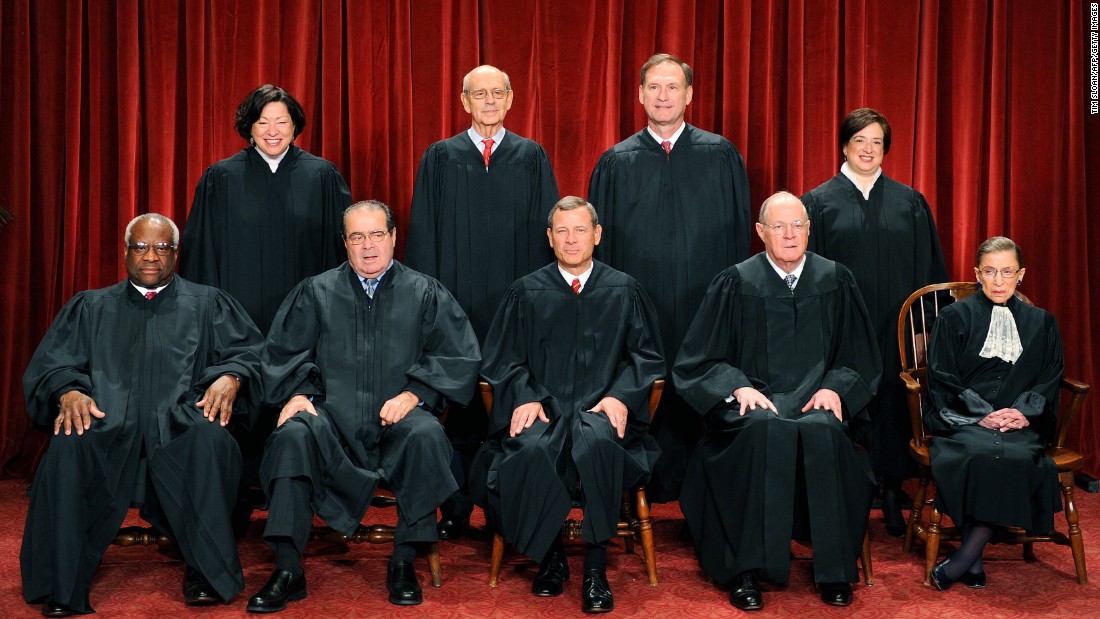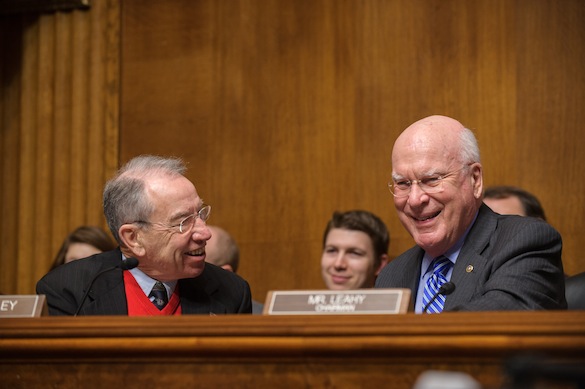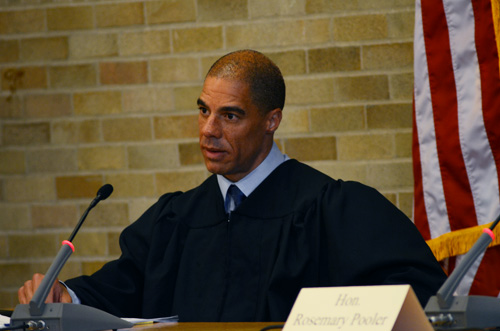Courtesy of wikipedia.com
The news yesterday of the death of Justice Scalia created noticeable shock waves through the political landscape, as conservatives and liberals were sent into a frenzy over who will fill the vacant seat. Regardless of your political beliefs, you have to admire someone who was a member of the highest court in the land for nearly 30 years, and was unwavering in his beliefs. I personally didn't spend my nights in law school reading over Scalia dissents, due largely to the fact that they were dissents, and while filled with interesting rhetoric and a unique legal philosophical viewpoint, they weren't binding authority or part of the holding. That having been said, you can still have an admiration for someone's ideological doctrine and the implementation of that doctrine, while disagreeing with tenets of it.
Courtesy of cnn.com
The make up of the court is about as politically split as it can be with 5 justices (including the late Justice Scalia) being appointed by Republicans: Scalia, Kennedy, Thomas, Roberts, and Alito, and 4 justices being appointed by Democrats: Ginsburg, Breyer, Sotomayor, and Kagan. While most would see this as a conservative court based on the appointments, Justice Kennedy has wielded immense power as he often casts the deciding vote in many 5-4 decisions, that are usually divided along party lines. This new appointment essentially shifts the power to the liberals, with 5 justices now being appointed by a Democratic president, with 3 true conservatives and 1 moderate being appointed by Republicans.
Courtesy of whitehouse.gov
So naturally, with a Democratic President having almost a year left on his term in which to nominate a replacement, both liberals and conservatives are highly aware of what this appointment could mean for future court rulings. President Obama offered his condolences to the Scalia family and highlighted his accomplishments in a brief speech honoring the late justice, but during that speech he also noted his duties and responsibilities to nominate a successor in a timely manner. Additionally, he purposefully noted that his nomination would come quickly enough to give the Senate an opportunity to approve or deny his appointment after a fair hearing.
Courtesy of reuters.com
Senate Majority Leader Mitch McConnell (R-KY) offered his thoughts, stating yesterday, "The American people should have a voice in the selection of their next Supreme Court Justice. Therefore, this vacancy should not be filled until we have a new president." Good luck with that. To be fair, it's clearly political rhetoric, and if the facts was reversed, you can bet the Democratic leadership would offer a similar statement, but what McConnell's words do make clear is that this is not going to be a smooth appointment based on the timing of the nominee. However, I think it's very evident that President Obama will have a nominee selected and sent to the Senate Judiciary Committee before April.
Courtesy of judiciary.senate.gov
So, why do Senator McConnell's words appointment carry any weight? The Senate Majority Leader develops the legislative calendar for the upcoming sessions, so he does have some influence on the process of confirmation, as the nominee's name would have to go to the Senate Judiciary Committee for a formal hearing followed by a vote by all members of the Senate. That committee is currently headed by Chuck Grassley (R-Iowa) with the Ranking Democratic Member being Patrick Leah (D-VT), but the bigger story is a junior member on the committee.
Courtesy of nationallawjournal.com
Republican Presidential hopeful and freshmen Senator Ted Cruz (R-TX) sits on this committee and depending how the primary process goes, you can be sure that his questioning of the nominee is going to be must see television. While, he'll likely still be campaigning at that point the free press he'll receive during the confirmation hearing is going to be far better than any campaign commercial.
Courtesy of pbs.org
I don't believe President Obama is brazen or foolish enough to nominate a justice that is so liberal that their nomination gets delayed long enough for the newly elected president to have a say on the nominee. He's bold, but he's also politically savvy enough to realize he has an opportunity to vastly change the ideological makeup of the Court, and he's not going to waste that opportunity.
He's also not going to nominate someone who's conservative, for obvious reasons, so that leaves his appointment as being either a moderate or a middle of the road liberal with a resume that's so impressive it'll be difficult to justify the blocking of the appointment, similar to the appointment of Chief Justice Roberts in 2005. So, let's take a look at some of the likely candidates the President could nominate for a confirmation to the U.S. Supreme Court.
Sri Srinviasan - Srinviasan, 48, is largely viewed as a moderate, and currently sits on the D.C. Circuit Court of Appeals, being appointed in 2013 by President Obama. He was born in India and attended Stanford for his undergraduate degree as well as his JD/MBA. He clerked for Justice O'Connor and was also Chief Deputy to the U.S. Solicitor General. Srinviasan was confirmed by a vote of 97-0 in 2013, so that is going to make it extremely difficult for Republicans to block his appointment without some serious backlash.
Courtesy of nationallawjournal.com
Merrick Garland - Garland also sits on the D.C. Circuit Court of Appeals and was appointed by President Clinton in 1997. He has served as the Chief Judge of that court since 2013. Garland is also viewed as a judicial moderate and was confirmed by a vote of 76-23. He holds his undergrad and law degrees from Harvard and was an antitrust law professor at Harvard during the 1980s. Garland also clerked for Justice Brennan and was seen as one of the top candidates to replace Justice Stevens upon his retirement, before President Obama nominated Elena Kagan. His age may be a difficult factor for Garland to overcome, as he's currently 63, but his resume is extremely impressive.
Courtesy of law.umich.edu
Paul Watford - Watford, 48, currently sits on the 9th Circuit Court of Appeals. Watford attended Cal-Berkeley for his undergraduate degree and UCLA for law school. He clerked for Judge Alex Kozinski and Justice Ginsburg, and also worked as a U.S. District Attorney prosecuting a large number of white collar crimes. He was confirmed to the 9th Circuit in 2012 after a nomination by President Obama, by a vote of 61-34, with nine Republicans voting in favor of his confirmation.
Courtesy of theusconstitution.org
Patricia Ann Millett - Millett, 52, like Srinviasan and Garland, also sits on the D.C. Circuit Court of Appeals. She was appointed in 2013 by President Obama, and confirmed by a 56-38 vote. The debate and vote on her nomination largely fell along party lines, and a motion to invoke cloture was made multiple times by Senator Reid to try and force a formal vote on her confirmation. She received her undergraduate degree from Illinois and her law degree from Harvard. Millett is considered a Supreme Court insider and impressively she's personally argued 32 cases in front of the Supreme Court.
Courtesy of legaltimes.typepad.com
Goodwin Liu - Liu, 45, currently sits as an Associate Justice on the Supreme Court for the State of California. He received his undergraduate degree from Stanford and law degree from Yale. He also teaches law at Cal-Berkeley. President Obama attempted to appoint Liu to the 9th Circuit in 2010, but his nomination was blocked by a filibuster, based on Liu's controversial writings and speeches. He has been highly critical of Justice Roberts and Alito, and after being successfully filibustered, he withdrew his name from consideration in 2011. He's viewed as very liberal and his nomination would likely be a long and arduous one, something President Obama desperately wants to avoid.
Courtesy of legaltimes.typepad.com
Jane Kelly - Kelly, 51, currently sits on the 8th Circuit Court of Appeals. She spent most of her career as public defender, but more importantly she previously had the backing of Republican Senator Chuck Grassley who sits as Chairman on the Senate Judiciary Committee. Kelly was confirmed by a vote of 96-0 in 2013. She received her undergraduate degree from Duke and her law degree from Harvard. It would be difficult to see her nomination getting blocked.
Courtesy of rainnews.com
With President Obama having already nominated two women, both confirmed to the U.S. Supreme Court, I'm not sure he makes it 3 in a row. Based on their age and the current makeup of the Court, Srinviasan and Watford are probably the top 2 candidates. The President could obviously go a different route, but nominating a moderate with a strong resume that forces the opposition to either concede defeat or go on the offensive with potentially dire consequences is the smart political move in an election year.











No comments:
Post a Comment